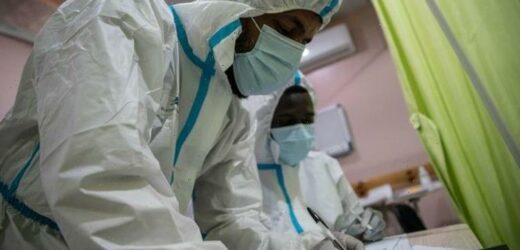South Sudan: ‘Billions’ of locusts land in Magwi
We use your sign-up to provide content in ways you’ve consented to and to improve our understanding of you. This may include adverts from us and 3rd parties based on our understanding. You can unsubscribe at any time. More info
The mystery disease seems to be baffling the country’s ministry of health, which reported that the illness had wiped out scores of people in the northern town of Fangak in Jonglei state. And now, the WHO has sent a rapid response team of scientists to the area to investigate by collecting samples from people who have fallen ill, the BBC reported.
Sheila Baya, from the WHO, told the BBC: “We decided to send a rapid response team to go and do risk assessment and investigation; that is when they will be able to collect samples from the sick people – but provisionally the figure that we got was that there were 89 deaths.”
The affected area was also one of the worst hit by recent severe flooding.
Ms Baya also said that the group of scientists had to enter Fangak via a helicopter because of this, and the team is now waiting for transport to return them to Juba, the capital city, on Wednesday.
According to Lam Tungwar Kueigwong, the state’s minister of land, housing and public utilities, in Unity, the state bordering Jonglei, severe floods have boosted the spread of diseases like malaria and caused malnutrition in children as a result of food shortages.


He added that oil from the fields in the region had contaminated the water which has led to the death of domesticated animals too.
The flooding in the north of South Sudan has been devastating to communities in the region, cutting them off from access to supplies of food and other essential commodities.
The United Nations refugee agency UNHCR said that over 700,000 people have been affected by the worst flooding in the country for nearly 60 years, which claims is due to climate change.

International charity Médecins Sans Frontières (MSF), which operates in the area, said the chaos caused by the flooding is now ramping up the pressure on the health facilities.
MSF said: “We are extremely concerned about malnutrition, with severe acute malnutrition levels two times the WHO threshold, and the number of children admitted to our hospital with severe malnutrition doubling since the start of the floods.”
This has come nearly a decade after South Sudan first gained independence following a brutal war.
DON’T MISS
Covid horror as ANOTHER new variant discovered in France [REVEAL]
Musk humiliated as Cybertruck’s ‘comically large’ flaw exposed [REPORT]
Brexit Britain could avoid energy shortages with renewable source [INSIGHT]


But the outgoing head of the UN mission in the country said in March that the country sadly still faces the threat of conflict, and has not been helped by the added threats of the climate crisis as well as the COVID-19 pandemic.
The vast majority of its population is reliant on international food aid, and even the most basic services like health and education are provided by the UN agencies and aid groups.
Source: Read Full Article


